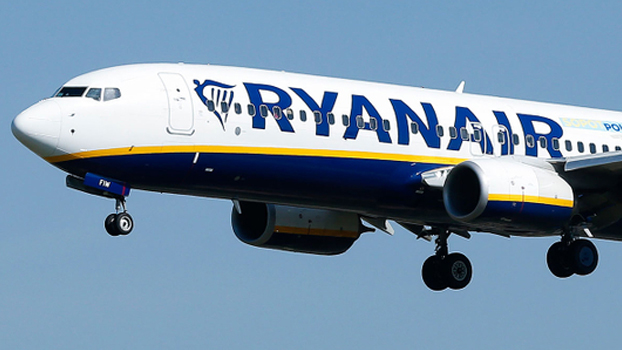How Belarus plane incident united European leaders

If you’ve never flown with Ryanair, you’ll never know what you’ve missed. The airline, the largest in Europe, has made billions – at least before the pandemic mostly put a stop to air travel – and has perfected the art of squeezing every possible revenue stream from every possible passenger.
It might cost you €5.99 (Dh27) to fly from Birmingham to Bordeaux or Eindhoven to Edinburgh, but make sure you follow Ryanair’s strict rules on luggage, don’t buy anything on board and follow all of the fine print when it comes to bookings.
The airline doesn’t use air bridges to go from airport terminal to plane, uses remote stands at regional airports – the landing fees are much lower – and CEO Michael O’Leary has mused about the Dublin-based airline charging customers to use the inboard toilets.
He’s even wondered why, in this age of high-tech cockpits, does the airline have to have two pilots in the cockpits. Couldn’t a trolley dolly sit in one of the cockpits seats instead along with a single pilot?
The cabin crew sell off scratch lottery cards on route and when the plane lands, there’s an annoying trumpet fanfare soundtrack played touting another on-time arrival by Ryanair.
That last element likely didn’t happen on Sunday when a Ryanair Boeing 737 – the only model the airline uses to limit maintenance and parts costs – was forced to land at Minsk.
Belarusian authorities scrambled a fighter jet and flagged what turned out to be a false bomb alert to force the plane to land on Sunday and then detained an opposition-minded journalist who was on board.
It was condemned by some EU leaders. The passenger plane flying from Athens to Lithuania was suddenly diverted to Minsk, the capital of Belarus, escorted there by a Soviet-era MiG-29 fighter jet. On its landing, authorities took journalist Roman Protasevich into custody. His girlfriend was also detained.
The brazen incident – O’Leary called it “air piracy” – has, however, managed to unify all 27 nations of the European Union in a way that far more serious foreign policy issues have failed to do so even in the past month.
Tough EU response
On Monday night, the EU27 heads of government quickly decided on a raft of sanctions and measures against Belarus over the incident. Belarusian airspace will be avoided by EU planes. EU airspace too has been shut to Belarusian planes, and no EU carriers will fly into the nation.
The leaders will consider other sanctions against companies and individuals linked to Belarusian airlines. Effectively, it has been isolated, with Ukraine too joining in the airspace and flight blockade.
Monday’s summit in Brussels was instead supposed to deal with other pressing foreign policy issues, the United Kingdom – and how it is failing to fully implement the Brexit agreement that places the customs union between the island of Great Britain and Northern Ireland – and Russia.
For weeks the Kremlin had been building up troops on the Ukrainian border, its operatives have allegedly been active in a series of incidents that include the use of nerve agents and a bombing, while cyberattacks too have been blamed on Moscow.
So, instead of dealing with those pressing issues, the EU27 were instead derailed into quick action against Alexander Lukashenko. He’s led the small nation for 27 years and, in the big scheme of things, is nothing more than an irritant neighbour on the eastern fringes of the bloc.
Last year, when Lukashenko was re-elected, street protests lasted for some two months. The EU imposed economic sanctions on the president and a few other individuals but, beyond that, the nation faded into relative insignificance.
There was coronavirus to deal with and, realistically, Lukashenko wasn’t going anywhere anytime soon because he had the backing of the Kremlin.
What Monday’s summit did was manufacture a veneer of toughness on the part of the EU27 on an issue that was relatively easy to condemn. You could easily imagine Charles Michel, president of the European council calling for order then asking for a hands up that could not condemn air piracy?
Who can support this outrageous and audacious act? And who would really miss the occasional flight from Belavia? Right, motion passed, job done. Now, let’s get down to supper….
Even if the EU27 had planned to get tough with Moscow, their potential actions were preempted by the announcement that US President Joe Biden and Russian President Vladimir Putin would hold their first face-to-face summit next month in Switzerland.
The Kremlin had been quick to point out that the EU was, for its part, silent when a plane carrying Bolivian President Evo Morales was forced to land in 2013, when US authorities thought Edward Snowden was on board on flight, or when a Belarusian passenger jet was made land shortly after take-off from Kyiv so Ukraine could arrest a passenger.
The reality is the EU as a united, single entity has a hard time making itself heard on the international stage. Cyprus and Greece both understand this better than anyone in recent times as they sought condemnation for Turkey over its oil-exploration surveys in disputed waters in the eastern Mediterranean.
Should the EU weigh in heavily, then Ankara opens the floodgates on the refugee crisis once more. Strong action against Russia? Poland, Hungary and the Czech Republic would tread lightly indeed.
Israel and its actions over the past month against the Gaza Strip? Political reputations have been broken trying to broker such a peace. Better to leave it to others.
But a plane flying between sovereign EU states? That’s low-hanging fruit for Brussels and the EU27 all day long.
The strength of the EU is its close economic cooperation and ease of movement forming the world’s third largest market of some 500 million people. Beyond that, it fails to have a relevant voice.
Mick O’Reilly is Foreign Correspondent at Gulf News



